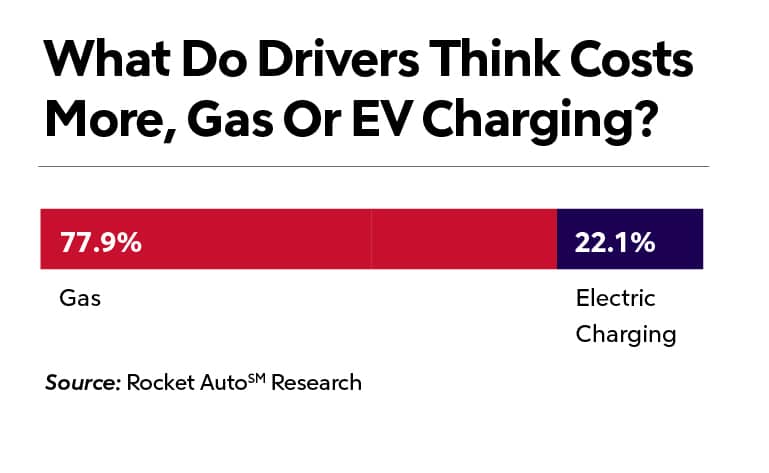
Higher Gas Prices Will Push More Americans Toward Buying An Electric Car
David Collins4-minute read
UPDATED: December 12, 2022
With U.S. gas prices at record highs and likely not coming down anytime soon, more Americans say they will consider buying an electric vehicle in the future. A March, 2022 survey of 3,000 vehicle owners conducted by Rocket AutoSM found that nearly 53% are considering going electric. This comes at a time when American Automobile Association (AAA) reports that the average cost of a gallon of gas in the United States is $4.24 per gallon, the highest in inflation adjusted dollars since 2014.
“Gas prices are out of this world and are only going to get worse,” one survey respondent said. The survey reveals that consumers will consider an electric car specifically to relieve pain at the pump. It found that 72.2% of drivers believe that EVs are better than gas vehicles when trying to save money.
In 2022, however, interest in electric cars is due to more than just rising gas prices. Other influences on the economy, such as inflation and rising housing prices, are forcing Americans to stretch their income further. A recent study by Pew Research found that the average driver uses an estimated 570 gallons of gasoline a year, which costs more than $2,400 after-tax dollars.
At the same time, new EVs are better today than they were just 5 years ago, and there are more on the market, stretching from traditional automakers like Ford and General Motors to all-electric car companies like Tesla. Every manufacturer has ventured into electric vehicle (EV) technology and offers multiple fully electric or hybrid (gas + electric powered engine) models. Battery technology is improving as well, increasing the range an EV can go before needing to recharge, which can take several hours.
Now, Americans are beginning to realize that electric vehicles are here to stay. As they know more people who drive electric, and they see more electric cars on the road, uncertainty about the new technology is waning.
78% Of Drivers Now Agree The Cost Of Gas Is Higher Than Electric Charging
The question of whether it is more expensive to purchase gasoline for a car or to charge the battery of an electric vehicle is complicated. Some cars are more efficient with a gallon of gas, and, depending on which state someone lives in and even which time of day someone is charging their car, the cost of electricity varies widely.
That said, among all survey respondents, 77.9% believe that it costs more to fuel their car with gas than it would be to charge an electric vehicle.

This number goes up among those who said they will consider buying an electric car. Of those, 85.2% believe that gas is more expensive than electric charging.
Aside from the economic factors that go into the gas vs. electric question, consumers also consider the environmental impact of their vehicle when deciding between the two. When drivers were asked what their primary reason is for considering electric, 47.3% of respondents said that having an eco-friendlier car was the most important consideration, while 40% said that saving money on gas was the primary benefit.
Results were similar among respondents who said they already own an electric car or are in the process of buying one. Of those, most (37.3%) cited environmental concerns like climate change as the reason they bought electric, with saving money on gas in second at 32.5%.
One outlier statistic centered on states that have notoriously high electric rates. Of the 24.8% minority that believe it costs more to charge an electric car than it does to purchase gasoline, 19.5% come from three states that are known for high electricity prices: California, New York and Florida.
48% Of Drivers Will Choose A Hybrid Or EV For Their Next Vehicle
When drivers were asked what type of vehicle they will get next, 48.2% said gas, while a combined 48.4% said hybrid or EV.

When looking at those who already knew filling a car up with gas costs more than charging an electric car, the percentage of drivers who said they would buy an electric or hybrid car for their next vehicle went up — but not significantly — to a combined 52.1%. This means that 44.9% of consumers will purchase a traditional gas-powered vehicle, despite acknowledging that it will cost more to operate (a negligible number would buy diesel).
Which Costs More, Gasoline Or Electricity? A Quick Analysis
A great many factors go into determining the difference in cost of charging an electric car versus filling it up at the gas tank. Both electricity and oil prices can change significantly depending on the time and place it is purchased as well as the efficiency of the vehicle. Just as all gas-powered cars have different level of efficiency with a gallon of gas, all electric vehicles vary on how far they can go on the exact same charge.
As of this writing, for instance, the average cost of a gallon of gas in the U.S. is $4.24 according to the AAA, and the average price of electric power is 13.72 cents a kilowatt-hour (kWh), according to the U.S. Energy Information Administration (2021). It should be noted that the price of gas varies widely among the 50 states — in California the cost is $5.91, while in Texas it’s $3.87. The cost of electricity also varies from state to state and even time of day (rates often drop during non-peak hours, such as overnight).
Using the average cost of gas across the United States, how much does it cost for a gas car to drive 250 miles, and what is the cost of the electricity required to go the same distance? A 2019 analysis by the Environmental Protection Agency determined that the average efficiency for all American cars was 24.9 mpg. Such a car would need 10 gallons of gas to go 250 miles. At $4.24 a gallon, it costs $42.40 in today’s dollars to go 250 miles.
How does this compare to the cost of an electric car traveling 250 miles? Power companies charge homes per kilowatt-hours used. In 2021 the average cost of a kilowatt-hour in the U.S. was $13.72 cents. The average electric vehicle gets 3.5 miles per kilowatt hour. Take the 250 miles and divide it by 3.5 equals about 71.5 kilowatts, which priced at 13.72 cents costs about $9.80 — more than $32 less than a gas-powered car. For someone who drives 1,000 miles a month, that’s a savings of more than $120 a month and more than $1,400 per year.
Of course, these factors are always fluctuating based on market forces — today’s gas prices are historically high, for instance — but it shows clearly that it costs significantly less to power an electric car.
Methodology
To understand motorists’ perceptions of EVs compared to gas vehicles, Rocket Auto surveyed 3,000 drivers. The sample was controlled to ensure there was an even split of men and women surveyed. The survey was conducted online from March 7 – March 18, 2022.
Table of Contents
David Collins
David Collins is a staff writer for Rocket Auto, Rocket Solar, and Rocket Homes. He has experience in communications for the automotive industry, reference publishing, and food and wine. He has a degree in English from the University of Michigan.
Related Resources
Viewing 1 - 3 of 3